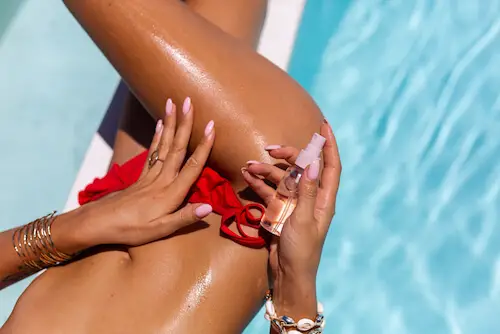Olive skin has a special quality to it that makes people want to know what skincare routine is best for it.
Olive skin, also known as yellow or golden undertones in skin, can be found mostly in women from Mediterranean backgrounds. Rather than having pinkish tones like some people, olive-skinned girls tend to have rich browns and dark yellows when they tan.
Olive skin naturally tans very easily because it contains more melanin than other types of skin do. This means that you can go out into the sun for just five minutes and come back with a nice bronze glow if you have olive-toned skin.
Olive skin is a beautiful and unique feature. The dark, olive pigment of the epidermis protects the body from harmful UV rays and provides protection against cancer-causing agents.

If you notice that your olive skin has started to tan more than usual then it may be time to start wearing sunscreen daily as well as limit exposure to direct sunlight between 11:00 am and 3:00 pm (when the sun’s rays are strongest).
You should also keep your skin well moisturized to prevent dryness and cracking that will increase the rate at which you tan. Moisturizing is especially vital after being in the sun because your skin becomes more vulnerable to damage during these times.
Tanning Olive Skin for a Golden glow
For those with olive-toned skin who want a golden glow without having their complexion turn orange, the best way to sunbathe is to make sure you first exfoliate your skin.
This will remove any dead skin cells that might be clinging onto your natural glow and prevent them from turning a darker color when you tan.
After you exfoliate, moisturize your skin with a high SPF sunscreen or body lotion.
This will help keep your skin soft and prevent it from drying out before you go out into the sun to be tanned.
Tanning oils for olive skin are less effective because they don’t contain enough SPF to protect your skin against UV rays that could damage the pigmentation in your pores
Instead, try using a tanning lotion that states it contains SPF for optimal protection.
Preventing Sun Damage to Olive Skin
To protect your olive-toned skin, you should regularly use sunscreen with an SPF of at least 30
Even when the sun isn’t beaming down directly on you, UV rays can still reach your face and cause damage to your skin’s protective layer.

When you go out into the sun, be sure not to stay outside for too long as that will increase your risk of developing redness and other sun-induced conditions such as eczema.
After a long day in the sun, wash off any excessive sunscreen from your face so it doesn’t clog your pores and the oil glands at the roots of your hair follicles can function properly.
Massaging your face with a washcloth or cleansing pad will help remove any excess sunscreen as well as dirt and sweat from outside so it doesn’t clog your pores as you sleep.
This is important because during the night is when your body recovers and repairs damaged skin cells.
A well-rested body is a healthy one and it will be easier to fight against sun damage if you get enough sleep every night
If your olive skin has been getting darker than usual it’s time to take a break from the sun for about two weeks, because too much sun can do more damage than good and cause your skin to develop sun sensitivity.
While you’re resting from the sun, drink plenty of water so your body can rehydrate and flush out any impurities.
If you notice that your olive skin has developed brown spots or other discoloration as a result of staying out in the sun, you should see a dermatologist to find out exactly what it is.
It could possibly be skin cancer, an early warning sign to prevent bigger problems down the road.
Before the summer ends, make sure to protect your olive skin by limiting your time in the sun and using sunscreen with an SPF of 30 or higher every day.
With just a few extra steps, you can keep your olive skin looking beautiful and healthy.

